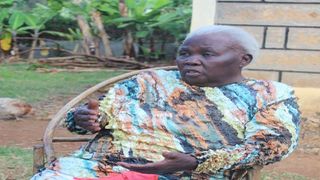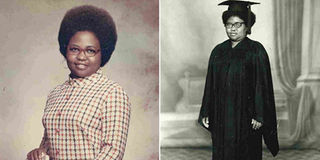
Ms Annrita Karimi who was the first elected female MP in Meru.
| File | Gitonga Marete | Nation Media GroupLifestyle
Premium
The short-lived career of first Meru woman MP
When the political bug bit her at the tender age of 34 in the lead-up to the 1974 General Election, not even her late father could convince her that politics was not the best option for her.
Even the struggles she had gone through during her studies in the United States between 1967 and 1970, where she obtained a degree in Education, could not convince her to remain in the teaching profession, which she later discovered was her calling.
Ms Annrita Karimi blocked her ears to all the “distracting” noises, hastily resigned from her job at St Mary’s Secondary School and plunged into politics to contest the then Meru Central parliamentary seat, now Imenti South.
“I had this burning ambition to lead and I believed being an MP would give me the opportunity to serve the people. Nothing could stop me from vying so I quit my job,” she said during an interview at her home in Igoji, Imenti South.
The names of five men contesting the seat included that of fiery, bearded pipe-smoking politician Kabeere M’Mbijiwe, who had deep connections and enjoyed the support of another powerful man, then Lands minister and President Jomo Kenyatta’s point-man in the region, Jackson Angaine.
Intimidation, voter bribery
A first-timer in politics, Ms Karimi had not learnt how to brave intimidation and voter bribery, so she came a distant fourth with 2,000 votes. She gave up on politics and went back to teaching. But what followed after a successful petition filed in Nairobi against the winner, M’Mbijiwe, would define her life forever.
“I was asked to be part of the petition, but I refused because I had no complaints, although they included my name. There were claims that the ballot boxes were open when they were transferred to the centre where counting was being done but I did not witness it. Against my wish, I was paraded as a witness during the petition,” she recalls.
But when M’Mbijiwe’s win was nullified on claims of voter intimidation and oathing, her political ambition nudged her. How it happened, she has never understood even to-date; she resigned again to vie during the 1975 by-election.
Having been barred, Ms Karimi recalls that M’Mbijiwe attempted to have President Jomo Kenyatta intervene, but failed.
“He travelled to Mombasa to see Mzee but he did not want to be disturbed. It was during the time the nation was mourning the death of JM Kariuki and there was a lot going on,” she says.
Won with a landslide
In protest against his detractors, M’Mbijiwe decided to throw his weight behind her to deny his political enemies a win. Ms Karimi won with a landslide – she cannot even remember the number of votes she got.
“I was happy,” she says, reliving one of the few memories that light up her life; it illuminates the face of the 80-year-old with the joy of becoming the first elected female MP in Meru. But this light suddenly disappears and is replaced by a gloomy look as she goes on to narrate what became of her political career.
In Parliament, she identified with vocal members of the House and became a champion of the oppressed, in the process not only winning admiration among her peers but also attracting criticism from her adversaries, including then Attorney-General Charles Njonjo.
She, however, exonerates Mr Njonjo from her tribulations, saying he was being pushed by “some forces”.
However, with M’Mbijiwe as a favourite regional point-man besides Angaine, the feeling was that her presence was spoiling the broth.
What happened in early 1978 would haunt Ms Karimi for the rest of her life – she was accused of embezzling funds at St Mary’s Secondary School. An audit of the school’s accounts during her tenure as headmistress in 1972 was carried out, which allegedly established she had stolen some money.

Ms Annrita Karimi in photos taking during her youth.
Convicted
Ms Kirimi’s stint in Parliament would be short-lived since by the end of the year, she was convicted by the Meru resident magistrate on charges of stealing Sh56,510.40 and jailed for two years. Her petition at the High Court seeking to be allowed to call witnesses including auditors to give her accounts a clean bill of health and her application that sought to prove her rights had been infringed upon was thrown out. The Appellate Court struck out her appeal.
Ms Karimi’s case established the principle that in matters concerning enforcement of fundamental rights and freedoms, “a petitioner must plead with particularity that of which he complains, the provision said to be infringed and the manner in which the particular right is violated.”
Controversial judgement
The controversial judgment has over the past four decades been criticised in legal circles as a travesty of justice that sought to serve the then oppressive Kanu regime.
It has remained a “ghost” in law that is yet to be exorcised, with legal scholars debating on the legality or illegality of the decision. Many petitions have been struck out, with judges relying on Annrita’s judgement.
She says even while in prison, some individuals tried to convict her again after her car – a Peugeot 204 – was involved in an accident that she believes was stage-managed. A case was filed at the magistrate’s court in Meru alleging that she had given out the car to an unlicensed driver. But it was struck out.
It was while in prison that she relived her life as a teacher and wished she had listened to her father, who had pleaded with her not to get into politics.
She recalled how Nicholas Biwott, who was later to become President Daniel Moi’s era power man, introduced her to a college in the US while he was working in Meru as a District Officer. At the time, she had just completed her training and was teaching at a primary school.
“I had a friend who worked in his office and one day when a vehicle came to pick her up, Biwott was inside. My friend had told me he was a good man and had helped many students secure scholarships,” she recalls.
“Since I had expressed my desire to study abroad, she introduced me to him. He looked at me and asked softly, ‘which college do you want to join?’ I had no idea so I kept quiet. He drew some brochures from the glove compartment and handed them over and said, looking ahead: ‘Go and try your luck.’ The vehicle drove off and when I went back to the house, I spent the whole day studying the brochures,” she says.
While in jail, the Loreto Convent alumna recalls, her mind would wander to the US, where she had painstakingly endured college life in Minnesota on a Catholic Church scholarship, wondering whether her decision to get into politics was worth it.
Never married
I ask her why she did not remain in the US and perhaps get a suitor and live in the ‘land of opportunities’. She smiles at the thought, but quickly dismisses it, saying that would have been selfish given she had left behind her child in the care of a friend. A mother of two daughters and a son, Ms Karimi has never been married.
The jail term forced her to leave her children in the care of relatives and effectively tossed her into political oblivion. Scarred and scared, after her release in 1979, she quit politics and went back to teaching until she retired in 1994.
She says due to the experience, she does not trust people, and does not like inviting anyone to her home.
While it took more than a month to secure this interview, which was conducted last month, Ms Karimi neither keeps a photo album nor likes being photographed.
Currently, she is completing a house project that has been ongoing for a couple of years now, she says.
After Ms Karimi’s experience, no woman has ever been elected MP in Meru until the 2010 Constitution opened the window for election of a woman rep.
“I cannot say my experience scared women to the extent that they shied from contesting. But what I can tell them is that they should struggle to get into elective politics if they really want to make a mark in leadership,” she says.
No grudge
As the nation celebrated Mashujaa Day, Ms Karimi said there is need to honour those who sacrificed their lives so that the rest of Kenyans could enjoy freedom.
“For instance, the Sh2,000 senior citizens are paid comes with a lot of pain and struggle. The government should streamline the process so that the beneficiaries are able to access the money easily,” says Ms Karimi, who adds that although she was bitter about the injustice meted out on her, she has forgiven those who sent her to jail.
“I have no grudge against anybody. I turned the other cheek and left all my problems to God, who has been the source of my strength especially with my failing health in old age. My children have also been very supportive otherwise I would not be alive today,” she says.




